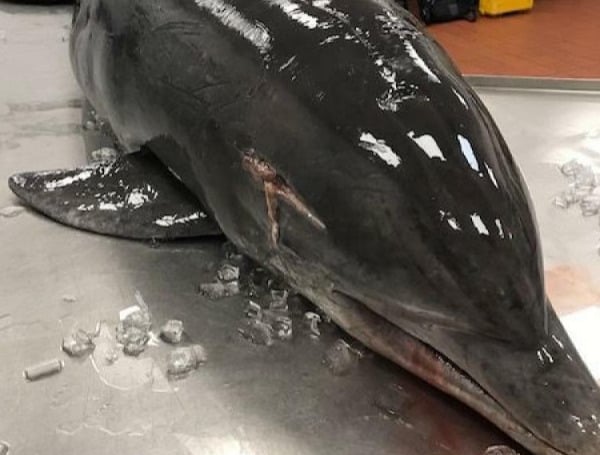NOAA’s Office of Law Enforcement is asking the public for any information about a dead dolphin found recently on Fort Myers Beach, Florida.
A necropsy, non-human autopsy, revealed the dolphin was impaled in the head with a spear-like object while alive.
On March 24, NOAA and marine mammal experts received a report of a dead bottlenose dolphin. NOAA’s stranding network partner, the Florida Fish, and Wildlife Conservation Commission, recovered the animal.
Further examination indicated the wound, above the right eye, was inflicted before the animal died. The dolphin was an adult lactating female. The animal appeared to have died from the trauma, which occurred at or near the time of death.
Based on the shape, size and characteristics of the wound, it is suspected that the dolphin was impaled while in a begging position.
Begging is not a natural behavior for dolphins and is frequently associated with illegal feeding. People can help prevent future harm to wild dolphins by not feeding or attempting to feed them. Dolphins fed by people learn to associate people, boats, and fishing gear with food, which puts dolphins and people in harmful situations.
Violent incidents toward dolphins in the Gulf of Mexico continue. Since 2002, at least 27 dolphins (including this one), have stranded with evidence of being shot by guns or arrows, or impaled with sharp objects.
Harassing, harming, killing or feeding wild dolphins is prohibited under the Marine Mammal Protection Act. Violations can be prosecuted civilly or criminally and are punishable by up to $100,000 in fines and up to 1 year in jail per violation.
NOAA law enforcement officials seek information from anyone who may have details of this incident. Please call the NOAA Enforcement Hotline at (800) 853-1964. Tips may be left anonymously.
Visit Tampafp.com for Politics, Tampa Area Local News, Sports, and National Headlines. Support journalism by clicking here to our GiveSendGo or sign up for our free newsletter by clicking here.
Android Users, Click Here To Download The Free Press App And Never Miss A Story. Follow Us On Facebook Here Or Twitter Here.

